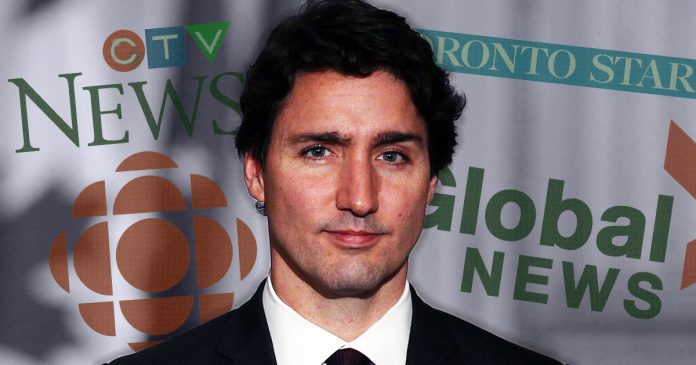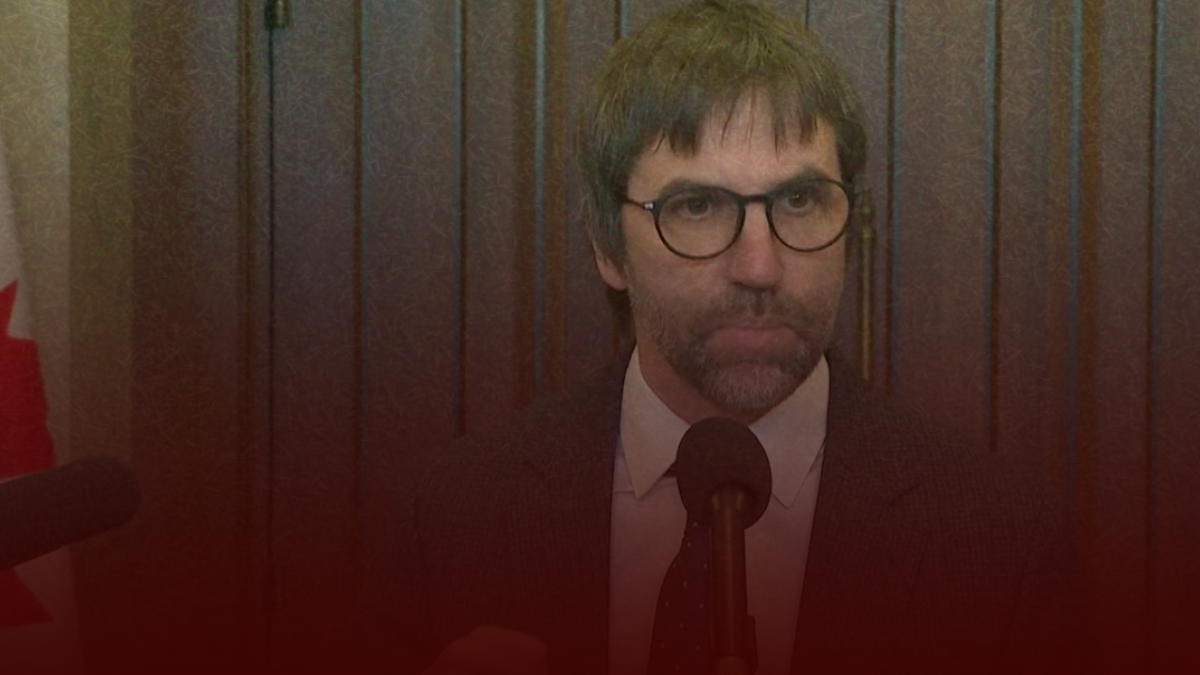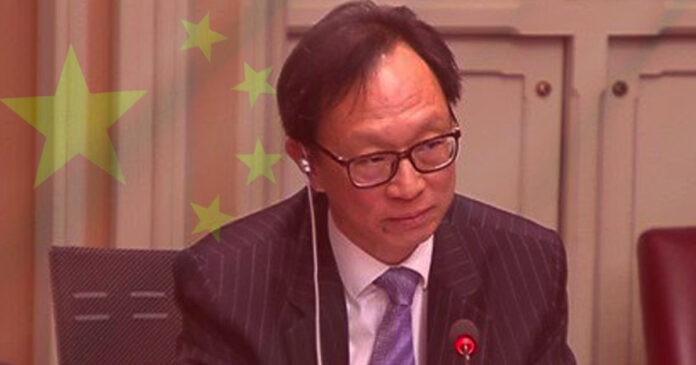Alberta Pastor Artur Pawlowski was arrested on the tarmac after landing at Calgary airport on what his lawyer says are outstanding contempt of court charges. True North’s Andrew Lawton says Pawlowski’s arrest and crackdowns on businesses not complying with vaccine passports are further reminders that enforcement is the new norm, with governments having long abandoned the “we’re all in this together” routine. Also, Canadian Taxpayers Federation Alberta director Kevin Lacey joins the show to talk about Alberta’s upcoming equalization referendum.
O’Toole’s Bait and Switch
On today’s episode of the Candice Malcolm Show, Candice outlines how O’Toole duped CPC party members by running as an authentic conservative. In fact, O’Toole 2020 leadership campaign focused on attacking Peter Mackay and warning CPC members not to go with a “Liberal-lite” candidate who would take the party back to the “mushy middle.”
Ironic! Given that O’Toole did just that. But this isn’t the first time this has happened to Conservatives.
Former Ontario PC Leader Patrick Brown played the same trick. He pretended to be a grass-roots conservative, then as soon as he got elected he showed his true colours: banning social conservative issues and introducing a carbon tax.
Brown is a case study in bait and switch conservatism, and should be a cautionary tail.
Instead, O’Toole used his playbook. And just like Brown, O’Toole failed.
Jason Kenney says Conservatives should resist “instinct” to drop leader after loss
Alberta Premier Jason Kenney says the federal Conservatives should work to “maintain stability” as calls mount to drop Erin O’Toole as leader following last week’s electoral loss.
Speaking to reporters Tuesday evening in Calgary, Kenney pointed out that Stephen Harper’s decade in government, in which Kenney served as a cabinet minister, followed a loss in 2004.
“A party like the federal Conservatives should maintain stability,” Kenney said. “I was part of Prime MInister Harper’s Conservative party when he lost the 2004 election. Many people were disappointed. He went on to become prime minister and form a very effective government for the next decade.”
When asked Tuesday whether he supported O’Toole’s continued leadership of the Conservatives, Kenney said a revolving door of leaders undermines public confidence in the party.
“Constantly changing leaders doesn’t create a public confidence, and I think to be a leader, as Mr. O’Toole has tried to be, in the context of a pandemic is especially challenging to get your message out, to meet Canadians, to get to be known,” Kenney said. “I’m sure that Erin is going to work with his team to identify things that could have been done better in this campaign and the lead-up to it, to listen to grassroots party members. But I think the immediate instinct to remove a leader after a disappointing election outcome just creates constant instability.”
Kenney endorsed O’Toole’s successful leadership bid in 2020, specifically citing his unapologetic conservatism.
“We need a leader who is competent and principled,” Kenney said at the time. “A leader who won’t run away from conservative principles under pressure from the media or the Left.”
While the Conservatives slightly increased their share of the popular vote compared to 2019, they lost two seats overall.
O’Toole has faced criticism from within his party for running a centrist campaign and flip-flopping on key policies, despite his vaunted “true blue leadership” promise from last year. Last week, a Conservative national councillor launched a petition to recall O’Toole, accusing him of “betraying” the Conservative base.
An unsuccessful election campaign automatically triggers a leadership review under the Conservative constitution, but this isn’t set to take place until the next convention, which is scheduled for 2023. O’Toole’s critics have noted there could be another federal election before then.
In an email to supporters Tuesday afternoon, O’Toole expressed pride that “Canadians said no to a Liberal majority.”
“Thanks to Conservatives like you, we ran one of the best campaigns I’ve ever been a part of,” he said.
O’Toole has committed to a “fulsome” review of the campaign to ascertain what went right and wrong, though he has committed to remaining leader and building on his showing in this election next time.
Kenney is facing a similar leadership challenge from within his party. Hours before his press conference, United Conservative Party MLA Angela Pitt said she no longer had confidence in Kenney’s leadership. This followed a similar condemnation from another UCP MLA, Leela Aheer, a week prior.
Health units prepping to vaccinate 5-11 year olds against COVID when approved
A number of Ontario health units are getting ready to vaccinate children aged five to 11, anticipating future Health Canada approval of a COVID-19 vaccine for use on children under 12.
Last week, vaccine producer Pfizer said it planned to share data with Health Canada showing the effectiveness of its vaccine on children aged five to 11, with the goal of seeking authorization for use “as early as possible.”
Toronto Public Health has formed a COVID-19 Vaccination Planning group in anticipation of Health Canada’s approval.
“Toronto Public Health has formed this Vaccination Planning Group so that our city will be ready to help children get vaccinated as quickly as possible,” said Toronto Mayor John Tory.
Toronto is also asking the Ontario government to make the COVID-19 vaccine mandatory for students.
The Niagara and Waterloo regions in Ontario also announced Monday they’re preparing campaigns to extend vaccination to kids under 12, when approved.
“Vaccines are our best protection against COVID-19 and the Delta variant,” said Chair of Toronto’s Board of Health Joe Cressy. “Toronto Public Health is proactively working hard in preparation for the time when vaccines are approved for children ages 5 to 11. Whenever vaccines are approved for use, Team Toronto will be ready to provide vaccines to our kids quickly, easily, and equitably,” he explained.
There are approximately 200,000 children in Ontario who are presently eligible to get the COVID-19 vaccine.
The City of Toronto claims that “receiving two doses of the vaccine will help protect residents from severe illness and outcomes, and protect our young children, friends, families and other loved ones.”
An August report by Public Health Ontario (PHO) revealed that more than half of all people sent to the hospital with vaccine-related heart issues were youth under the age of 25.
Ontario saw 202 admissions to the emergency room from all age groups after receiving a vaccine. 86% of Ontarians over the age of 12 have received at least one dose of a COVID-19 vaccine. When it comes to full vaccination, a total of 71% of people in the province have received their second dose, according to official data.
Pandemic pay cuts impacted businesses but not governments, research shows
A new study by the think tank SecondStreet.org finds no governments in Canada have reduced pay for their civil servants even as businesses have been forced to lay off staff and cut wages due to government-imposed lockdown measures.
According to the report, which relied on freedom of information requests from federal, provincial and municipal governments, pay cuts were non-existent over the duration of the pandemic.
“Generally speaking, government employee pay in Canada only goes up, it almost never goes down,” SecondStreet.org President Colin Craig said.
“It’s not sustainable for governments to keep spending more than they’re raising in revenues. Instead of raising taxes or laying off employees, governments could find savings by reducing employee pay.”
The federal government was unable to provide any records of reducing pay for its employees including over the past year.
“Our sector officials indicated that there is no data or any information that indicates that there has ever been a negotiated pay reduction,” the federal government informed the think tank.
Additionally, no provincial government in Canada has reduced pay for its staff either, though Manitoba did require provincial employees to take five unpaid days off work in 2020.
As for the 13 large cities included in the report, not one was able to produce evidence that it had cut pay to employees. Only Mississauga had announced a pay cut for two library positions but the cuts would only affect new employees and not existing staff.
According to a recent report by the Canadian Taxpayers Federation, the private sector in Canada took a severe hit during the pandemic while government jobs and pay raises surged.
In total, 312,825 federal workers received a pay raise between 2020 and 2021.
Five conservative leadership policies O’Toole abandoned during general election
Erin O’Toole’s failed campaign to unseat prime minister Justin Trudeau saw him backtrack and flip flop on several key policies from the Conservative leadership campaign just one year prior.
O’Toole positioned himself as a “true blue conservative,” in contrast with his primary leadership foe Peter MacKay. However, the Conservatives’ general election campaign has been criticized by the party’s base as anything but “true blue.”
True North has compiled five key policies that Erin O’Toole used to woo Conservatives in the leadership campaign only to then turn around and appeal to Liberals in the general election.
Repealing the Liberal gun ban
During the 2020 CPC leadership race, O’Toole’s “True Blue Leadership” platform said he would oppose the Trudeau government’s proposals to confiscate legal firearms from Canadians. His platform specifically committed to repealing the Liberals’ May 2020 order-in-council prohibiting over 1500 firearm models and variants.
The August 16 launch of the Conservative Party Platform included the same promise to repeal the Liberal gun ban however, weeks later, O’Toole publicly flip flopped and said a Conservative government would “maintain the restrictions that were put in place in 2020.”
The Conservatives then added a footnote to their platform which stated, “All firearms that are currently banned will remain banned.”
Repealing the carbon tax
In the Conservative leadership race, O’Toole’s platform clearly stated that he would scrap the Trudeau carbon tax and that he would not be interfering with provincial jurisdiction over a federal carbon tax scheme.
His leadership platform stated, “A carbon tax is not an Environmental Plan, it is a Tax Plan. We need a smarter approach.” He doubled down on his commitment to scrap the tax by saying, “I will respect the jurisdiction of the provinces and territories by scrapping Trudeau’s carbon tax.”
O’Toole even signed the Canadian Taxpayers Federation pledge eschewing a carbon tax.
In April, however, O’Toole announced that the Conservatives would implement a “low-carbon savings account,” which would allow Canadians to pay a surcharge on products the government deems as environmentally unfriendly. The money that is spent on that tax can then be used to purchase things that help Canadians live a “greener life.” This program was billed by the Conservatives as a “loyalty-card” style system that you see from other retailers.
The O’Toole carbon tax was criticized by the Canadian Taxpayers Federation.
Defending conscience rights for healthcare workers
During the leadership election, O’Toole’s platform stated that he would use legislation to protect the rights of healthcare workers to not have to refer patients for medical procedures that violated their conscience, specifically surrounding abortion and medically assisted dying. The platform stated, “Through legislation, protecting the conscience rights of all health care professionals whose beliefs, religious or otherwise, prevent them from carrying out or referring patients for services that violate their conscience.”
The Conservative party platform for the general election also committed to protecting the conscience rights of healthcare professionals, but O’Toole walked it back when faced with media questions, insisting instead that healthcare practitioners must refer patients for abortions even if it violates their own conscience.
Equalization
The leadership election provided O’Toole an opportunity to appeal directly to Alberta voters. He made it clear that the equalization formula as it stands is not fair to Alberta and that they shouldn’t have to send money to other provinces when they are in a recession.
O’Toole’s leadership election platform stated “A province with an economy in recession and a skyrocketing unemployment rate should not be forced to send money to other provinces.”
O’Toole’s national campaign however struck a different tone. O’Toole campaigned hard in Quebec and only committed two sentences of his platform to equalization, saying “We will add fairness to Equalization by adopting the Equalization and Transfers Fairness Act as a government bill and passing it as quickly as possible. This will add transparency to Equalization.”
While the Conservatives still won nearly all Alberta seats, they lost 14 percent of the provincial vote share, going from 69% of the provincial vote in 2019 down to just over 55% in 2021, even losing a couple of seats in the process to the Liberals and NDP.
Free votes for caucus members on matters of conscience
During the leadership race, O’Toole attacked Peter MacKay in an email blast to his supporters saying that MacKay wouldn’t allow MPs to vote their conscience on moral issues, after MacKay indicated he would expect members of his cabinet to fall in line on such matters. O’Toole vowed to “never whip any Member of Parliament, be they in cabinet or the backbench, on moral issues.”
O’Toole’s leadership campaign was asked to define “moral issues” and described them as “issues of moral conscience that can include a diverse range of deeply-held personal convictions.”
During the federal election campaign, O’Toole said every Conservative candidate fully backed his platform and that if they didn’t they wouldn’t be allowed to sit as a Conservative MP saying, “If there are candidates who don’t support it—or any other part of Canada’s Recovery Plan—they won’t be sitting in the caucus of a future Conservative government.” When asked if this was a reversal of his position on conscience rights, O’Toole didn’t give a clear answer.
Jonas Smith was disqualified as Conservative candidate after voicing opposition to mandatory vaccines in the workplace and the implementation of vaccine passports.
Former cabinet minister accuses senator of being “mouthpiece for foreign propaganda”
Former Conservative cabinet minister and diplomat Chris Alexander says a Liberal-appointed senator is unfit for office after promoting a column that says Canada took Huawei CFO Meng Wanzhou “hostage.”
Alexander, who served as the citizenship and immigration minister in the latter part of Stephen Harper’s government, said Senator Yuen Pau-Woo has betrayed his oath and should resign.
Woo shared a Toronto Star column by a retired professor making the claim that Canada and the United States “took Meng hostage.”
“The United States, assisted by Canada, took Meng hostage in the first place as part of its trade-and-technology war with China; Beijing swiftly retaliated by jailing the Canadian citizens Michael Kovrig and Michael Spavor,” the column said.
By sharing it, Alexander said Woo was serving as a “mouthpiece for foreign propaganda.”
“(Woo) has violated his oath as a Canadian Senator & should resign,” Alexander said on Twitter. “Mouthpieces for foreign propaganda, including those backed by China’s United Front Work Department, should have no place in Canada’s parliament.”
Meng was arrested that year after being charged with wire fraud by US authorities for her company’s dealings with Iran. Following negotiations by the US Justice Department and Meng’s prosecutors, a deal was struck and Meng was released back to China.
Woo has faced scrutiny for several controversial remarks which critics claim serve to paint the communist Chinese government in a favorable light.
In June, Woo lectured Canadians on the residential schooling system and went on a tirade in defence of the Chinese regime’s legitimacy.
“The fact that China does not share our view of individual freedoms or, indeed, our interpretation of freedoms based on the Charter is not a basis on which to lecture the Chinese on how they should govern themselves,” said Woo.
Woo also described China’s internment of minorities and Uyghur muslims and being “motivated by the fight against terrorism” and a desire by China to “provide employable skills for minorities.”
The Trudeau Liberals are making a mockery of our immigration system
Elections have consequences, and one of the most severe downsides of Canada re-electing Justin Trudeau is that it allows him to further cheapen Canada’s citizenship by eliminating our rules-based immigration system.
The latest directive from Trudeau is to infuse our system with divisive race-based identity politics.
If you identify as “intersectional” — meaning if you’re not a straight white male, the rules no longer apply to you.
You can come to Canada, no questions asked. Even if you LIE on your application, it doesn’t matter anymore. Trudeau just chalks that up to the “trauma” involved in seeking refugee status.
The Trudeau Liberals are making a mockery of our immigraiton system, cheapening the value of a Canadian passport and becoming the laughing stock of the entire world — all in exchange for more Liberal votes.
Candice breaks it all down in the latest episode of the Candice Malcolm Show.

























